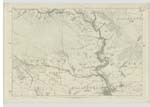OS1/25/42/15
| List of names as written | Various modes of spelling | Authorities for spelling | Situation | Description remarks |
|---|---|---|---|---|
| Supposed Site of the BATTLE OF MONS GRAMPIUS (Continued) | 052 | [continued from page 14] while from the conflicting hosts arises the din of battle, the fierce clang of arms, and the yells of the barbarous combatants, no description of such a scene can be otherwise than tame, and therefore, we leave it to your own vivid imagination to fill up the picture - the outlines of which we have feebly attempted to sketch. Now reader, have we succeeded, think you, in establishing our position with regard to the locality of this same battle of Mons Grampius? What say you - are you satisfied that the district now under our view, and none other, was the veritable field of that famous fight? No: we see by your looks that you are not yet convinced: it is evident that there is something sticking in your gizzard which prevents our argument carrying entire conviction to your mind. But dont interrupt us, we know very well where the difficulty lies, & shall smooth it for you. You would tells us that the Roman fleet could not have been visible from any point of the position we assign to the Caledonians, which must needs have been the case according to Tacitus, because their leader, in his famous harangue before the battle, is made to say "imminente nobis classe Romana" and again you would argue the scene of the engagement must have been much farther north than we place it. inasmuch as Galgacus in another part of his oration says "Sed nilla jum ultra gens nihil nisi fluctus et saxa" We see you have been a good boy, and attended to what you have read at School but you must not imagine that we have overlooked the objections proponed, though we would willingly have avoided the waste of time and trouble in refuting, most erudite reader, that the expressions you quote against us do not occur in the narrative of Tacitus, where a rigid adherence to facts is to be presumed but are nothing more than figures of rhetoric in a fictitious harangue introduced by the historian merely to "adorn a tale", and evince his own eloquence; wherefore we deny that these accidental expressions are entitled to weight of facts, directly stated as such. Let us, however, examine the objections separately. Of the first we make small account: it rests entirely upon an inference from the expression already quoted, that the Roman fleet was within view of the supposed speaker - by no means legitimate. The literal meaning of the words is "the Roman fleet is impending over (or threatening) us"; or as the whole passage is more freely and elegantly rendered by Murphy - "even the sea is shut against us, while the Roman fleet is hovering on the coast." which Galgacus might with truth have said although the fleet had not only not been in sight, but though it had been on the distant coast of Argyle, and the speaker standing on the spot we have supposed him to occupy. As for the other passage you found upon "sed nulla jam ultra gens, nihil nisi fluctus et saxa". Galagacus is speaking of the false expectations entertained by the Romans, of an important conquest still to be achieved by them, and says, but beyond this there is no people, nothing but waves and barren rocks, which was probably no great exaggeration at that period, supposing his position to have been the one we contend for. Moreover, he immediately adds "et interiores Romani" (the Romans are in the heart of the country) an expression as incompatible with your objection as it is entirely accordant with our theory." Perthshire Constitutional 4th November 1840. "After Keithock, General Roy observes that another station should be looked for near to Monboddo in the Mearns which has been accordingly found hard by at Fordoun - Here a Pretorium is still distinctly to be traced and also some appearance of a large Camp surrounding it at a distance of an ordinary Roman March about 12 miles from the one at Kiethock, and the same distance from the west station at Stonehaven where the real Mons Gampius will be found - at this place the Grampian Hills approach so near the sea that the army of Agricola could not have marched farther to the north without passing through them ( as it will be found [continued on page 16] |
Continued entries/extra info
[Page] 15Transcribers who have contributed to this page.
Alison James- Moderator, Brenda Pollock
Location information for this page.
Linked mapsheets.




